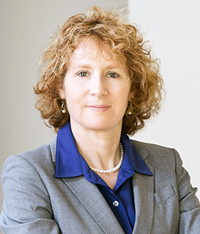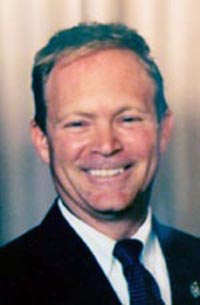
By Donald H. Harrison
SAN DIEGO—Two members of the Jewish community are seeking election as California Superior Court judges in the June 3 election. Carla Keehn, a federal prosecutor, is opposing Judge Lisa Schall for Office No. 20, while Brad A. Weinreb, a California deputy attorney general, is seeking to prevail in a three-candidate race for Office No. 25, which incumbent Cynthia Bashant has decided to give up at the end of her term. Bashant has been nominated by President Obama to serve as a federal judge, a nomination awaiting Senate confirmation.

The two Jewish candidates have many differences in the labels people might attach to them – Keehn is a federal prosecutor, Weinreb is a state prosecutor. Keehn is a Democrat, Weinreb is a Republican. Keehn is a woman, Weinreb is a man. Keehn is a lesbian, Weinreb is straight. Keehn is married, Weinreb is divorced. However, in a joint telephone interview, I found that these two lawyers also have quite a bit in common. They both value and teach their families’ Jewish traditions, and they both express respect—I’m tempted to call it “near reverence” — for the majesty of the law.
Their Jewish Backgrounds
When I asked them about their Jewish backgrounds, Keehn told me she had grown up in the San Gabriel Valley, and from about the age of nine or ten attended Camp Hess Kramer in the Malibu area, a camp associated with Reform Judaism and the Wilshire Boulevard Temple where her family worshiped. Camp, she said, was very impactful on her, and support for Israel “is something that is a deeply held value for me.” Her love of Jewish tradition, she added, is reflected in the choice of Biblical names for her children, Samuel, Hannah and Nathan. Besides for the biblical Hannah, said Keehn, her daughter also is named for Hannah Senesh, who was killed behind Nazi lines trying to bring aid to Jews, and the historian Hannah Arendt.
Keehn’s three children have attended Soille San Diego Hebrew Day School and the San Diego Jewish Academy. Now the family is active at Ner Tamid Synagogue in Poway, where Keehn’s spouse, Sandy, is a member of the Conservative congregation’s board of directors. The candidate said she took her spouse’s last name in honor of her father-in-law, who she described as someone who fought against the Nazis from the time they invaded Poland until the end of World War II.
Weinreb told me that during his boyhood his parents had moved from New York to Plano, Texas, near Dallas. “It was primarily farm land” but now is home to numerous corporate headquarters. He said he attended high school where he was among 4 or 5 Jewish students in a student population of 3,000. “I grew up in an area where there was still a lot of anti-Semitism, and I tried to educate people.” So did his mother, who came to his school to tell about the Jewish holidays.
He said he was active in the B’nai B’rith Youth Organization (BBYO) and United Synagogue Youth (USY), and served as southwestern vice president for the USY, which periodically held regional Shabbatons in Arizona, Texas, Oklahoma and Louisiana. From there it was onto the University of Texas, where he joined a Jewish fraternity, Sigma Alpha Mu. When eventually he and his family settled in California, his children Brandon and Lauren went to JCC summer camps and to Camp Hess Kramer, and he worked with the Security and Safety Committee of the San Diego regional office of the Anti-Defamation League.
The Campaigns
Although the state constitution provides for the election of judges every six years, it is rare for sitting judges to be opposed. Most judges are reelected without opposition. Keehn said that she decided to oppose Schall because the judge was publicly admonished in 2008 by the Commission for Judicial Performance after she was found guilty of “alcohol related reckless driving.” In its findings the commission noted that the judge had been twice before admonished: in 1995 for “embroilment in a juvenile dependency case” and in 1999 for “abuse of the contempt power.” Keehn said this is the first time the public will have a chance to register its opinion about Schall since the latest findings of the Commission became known. She said that as one who has been both a prosecutor and a public defender, as well as a U.S. Army officer, she believes she is better qualified than the judge to sit on the bench. Schall is a Republican, and Keehn, a Democrat, has been endorsed by the San Diego County Democratic Central Committee
Bashant still was listed as the incumbent when Weinreb filed for the office, however, he said, he told colleagues and judges at the time that if, for any reason, she remained in the race, he would drop out. He said he wanted to make certain that if Bashant did withdraw from the race while her federal appointment was pending, that Ken Gosselin, an attorney and court volunteer, would not be the only candidate on the ballot. As it turned out, Weinreb, Gosselin and attorney Michelle Hagan, an attorney/ fraud investigator, all are competing. Gosselin is endorsed by the Republican party, Hagan by the Democrats, and Weinreb has strong support from law enforcement leaders like Sheriff Bill Gore as well as the county’s chief public defender Henry Coker. He also has the endorsement of Morris Casuto, the former ADL regional director in San Diego.
Legal Matters
“I have spent substantial time on both sides (defense and prosecution),” commented Keehn. “I believe in our Constitution and I believe that justice comes out through full, vigorous trials in trial courts. I have had more than 100 jury trials across my legal career. I also work on and have argued appellate cases before the 9th District U.S. Circuit Court, and I have filed over 20 to 25 briefs with the 9th Circuit.” Her knowledge of state courts also is extensive, she said. “I am an adjunct law professor at the Thomas Jefferson School of Law teaching California Evidence.” She said her career has been well rounded: “I have prosecuted thousands of cases, including bank robberies, assault, human trafficking, baby shaking, and drug smuggling. I also spearheaded a 2-year environmental investigation that was nationwide with the Department of Justice’s environmental crimes section.” Without going into details, she described that case as being similar to one in which oil from a storage tank was permitted to spill into ground water.
Weinreb said “I don’t think the responsibility of a judge is to interpret the law or inject his own personal opinions or views; it is the responsibility of a judge, just as it is for myself as a prosecutor, to enforce the law.“ He said he teaches a class at California Western Law School in Appellate Advocacy. “I make sure that the students understand that the role of the trial court judge is very different from the role of the appeals court judge. The trial court judge’s responsibility is to make credibility determinations based upon facts and to apply the law that exists.” Appellate courts, on the other hand, have an opportunity to “review and to make law and overrule precedent and law.”
Keehn said “our Superior Court judges are very important elected officials and, in fact, more than any other elected official, more than your mayor or city council person, you (the average citizen) is more likely to see a Superior Court judge… Anyone who goes into court understands very powerfully how important that person sitting on the bench is to their life. They can determine the custody of your children, your personal liberty in a criminal case, and if it is a civil case, where the money is distributed. We should care very much about the character and integrity of the person on the bench.”

Weinreb said that as an attorney, he has “investigated and prosecuted cases on the part of the California Commission on Judicial Performance,” adding “I have a keen awareness and appreciation for the judicial temperament and what it takes to have the appropriate demeanor and integrity for judges.“ He said a judge is bound by ethics both on and off the bench, and “if we can elect or appoint a person on the bench who can maintain those principles and provide everyone access, then we can maintain public trust in the judiciary and that is one of the things that I think is the hallmark of the judicial system.”
*
Donald H. Harrison is editor of San Diego Jewish World, which seeks sponsorships to be placed, as this notice is, just below articles that appear on our site. To inquire, call him at (619) 265-0808 or contact him via donald.harrison@sdjewishworld.com
Pingback: Senate confirms Cynthia Ann Bashant for U.S. bench - San Diego Jewish World